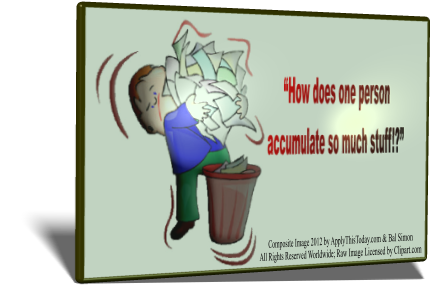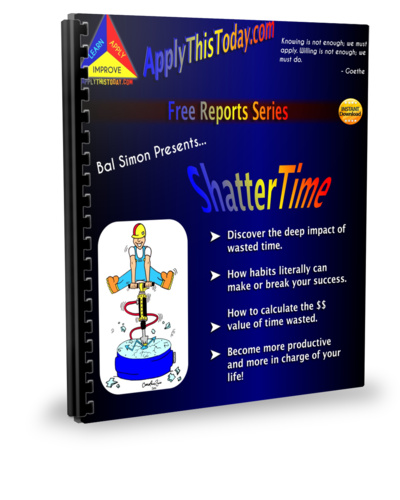Life Design – Lessons Learned (by accident)
 As mentioned earlier, an external hard drive failed. The backup service I used - I must have set it up wrong because it didn't back up what I thought I was backing up. My mistake and the first...
As mentioned earlier, an external hard drive failed. The backup service I used - I must have set it up wrong because it didn't back up what I thought I was backing up. My mistake and the first...
Lesson Learned: Verify that systems are working the way you think they should be working. And if they're not, FIX THEM before you have otherwise avoidable trouble.
We often talk about lessons learned. But what about lessons we are learning as we go along? Here's one.
Lesson Learning: When your house is struck by a meteor, look for the valuable metals and other "assets" it brought your way.
Translation: While I am having the hard drive being worked over to see if my data can be restored, I am also looking at this as an huge opportunity to start over.
I don't know what it is that makes me hesitate starting over on my own terms, when I am ready, and why I have to wait for something like this to strike. Maybe another lesson to learn is that every few months or so, I should re-examine things to see if I want to start over on my own terms.
Lesson Learned: Redundancy - NASA uses massive redundancy in its critical missions to ensure that if something goes wrong, the mission continues without a hiccup. What's good for NASA is good for me. With the price of data drives these days, and especially with the price of data recovery (if it is possible at all), there are far fewer justifications for not having redundant data drives. I figure I will have 3 - plus offsite backup that I configure and test (see the first Lesson Learned).
Drive #1 - main drive, the work horse.
Drive #2 - backup drive #1
Drive 33 - backup drive #2
Backup drive #2 will be stored offsite and refreshed every week, which is about the level of pain I can easily cope with should there be a site-wide failure, like the house getting flooded and then being overrun by fresh-water piranha, alligators and locus. My house might be gone, but by gum, I'll still have a data drive!
Lesson Learned: This is the big lesson. Recover psychologically as fast as you can. Doing a lessons learned exercise is a good way to start! But it's just an exercise. In my case, i started the psychological recovery within 2 hours of finding out I had a major computer problem. Notice that last sentence. I made sure to include a word in it that is part of my psychoogical recovery. The word? Computer. I had a computer problem. That's all. Just a problem with my comptuer. I was fine. My health - unaffected. My marriage? Strong as ever. My ability to enjoy my immediate environment? Unaffected. Plans for the day? Changed but clearly a choice as to whether I'd view them as an "Oy vey!" or an "Exciting stuff!"
Some Criteria For Keeping Stuff
I'm continuing the theme begun in the last entry, that I want to travel through life more lightly; not be a librarian – or worse, , a museum curator.
I therefore must jettison a lot of the stuff that I've accumulated over the years.
However, much as I want to travel lightly, I can't just grab a box of stuff and throw it, unexamined, into the recycle bin. I have to at least see what it is and then, if it doesn't measure up, get rid of it.
In the past, I would have had criteria to "justify" getting rid of stuff. Now I focus on the opposite: providing justification for keeping it.
This means criteria. I provide these criteria in the form of the following questions that I must answer.
- Is there a legal or contractual reason for me to hold on to a document? No means go on to the next questions.
- Is it something that I will make use of in the very near future?
- Is it something that will bring me great pleasure to see again? Alternatively, is it something I would truly miss if I didn't have it? For example, stories I've written. Music I've composed, etc.
- Is it something needed for personal and/or family purposes?
- Is it part of my personal or business identity?
- Is it a record of my personal development and evolution? My journals, for example. For you it might be photo albums? Etc.
- Does it support my infrastructure?
- Lastly – given all my negative answers to the above – do I really want to override the implication, i.e., that I ought to be getting rid of the item?
If I can't answer yes to any of the above questions, out it goes.
I anticipate getting rid of lotsof stuff.
P.S. - If you think I'm missing any that ought to be in this mix, I'd love to get your suggestions.
How to plan backwards
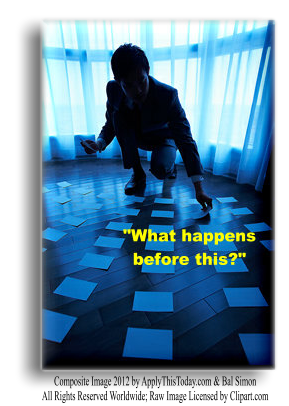 When I am at my most productive, it is because I have planned backwards. That is, I have a goal in mind and then I think through what it takes to get there. You CAN do this thought exercise by goring forward in time - from where you are right now to where you want to be when you've achieved your goal. And you can also ask yourself, what did I have to do in order to achieve this goal.
When I am at my most productive, it is because I have planned backwards. That is, I have a goal in mind and then I think through what it takes to get there. You CAN do this thought exercise by goring forward in time - from where you are right now to where you want to be when you've achieved your goal. And you can also ask yourself, what did I have to do in order to achieve this goal.
For instance, if I'm taking a trip to Norway for a wedding anniversary, thinking backwards might look like this.
- get off the plane
- get on the plane
- arrive at the airport
- pack
- make arrangements to arrive at airport
- book my flights
- check available flights
Then if I start from the bottom and successfully work my way up the list, I will very likely succeed in arriving in Norway at the appointed time.
Most goals can be treated in this way. Probably, including yours.
New Directive: Travel Through Life Lightly
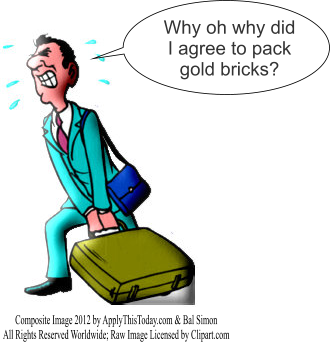 When I travel to a different city, I prefer to travel light. That means not carrying a bunch of extra stuff just because "I might need it." This is the complete opposite of how I have lived my life generally. I have lived it as if I live here, and "here" is a permanent location, and I'd better have everything I need so I can be prepared for anything.
When I travel to a different city, I prefer to travel light. That means not carrying a bunch of extra stuff just because "I might need it." This is the complete opposite of how I have lived my life generally. I have lived it as if I live here, and "here" is a permanent location, and I'd better have everything I need so I can be prepared for anything.
Of course, when "anything" happens, it all too often happens that despite my best laid plans, it turns out I didn't think of "everything" and I wasn't as prepared as I thought I was.
For instance, I thought I'd set up my computer to have automated backup. But no - it was actually set to manual backup, and when my external hard drive failed a few days ago, the backups were several months old. Better than nothing, but certainly not what I'd expected.
One of the positive things to come out of this is that even if my data can be restored, I'm going to set things up differently. Because I realized that I don't need 75% of the stuff that I've accumulated. Indeed, I should be going through a pruning procedure every week, and a more intensive one, every month.
I also set up the categories and tags by which I organize my stuff to be incredibly granulated. But looking back, what that made me was a librarian, and not a very good one at that. I had set things up to be findable - not to support goals, projects and tasks.
This is more a neuroprogramming thing (see John C. Lilly) than a computer thing. After all, the computer reflects my preferences, just as your computer reflects yours.
So - the new focus is on goals, projects and tasks. Giving up the librarian function will very likely mean that I can travel a lot more lightly.
The Week Behind
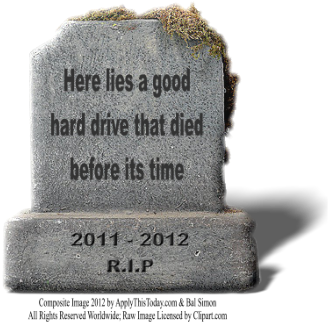 In the previous entry, I said that I'd try to spread out my posts throughout the week ahead.
In the previous entry, I said that I'd try to spread out my posts throughout the week ahead.
Here it is; time's up, and I'm doing it again - clustering them all at once. And yet, despite this, I feel a good sense of achievement.
The image for this post tells the tale. My hard drive failed, taking all of the information on it to an early grave. The drive is in a service center, with the techs trying to restore my data. (More on that in another post.)
I could have used this as an excuse to not publish this week. But
I chose to publish all the same.
About Opportunity! Read More...
Using Nanogoals
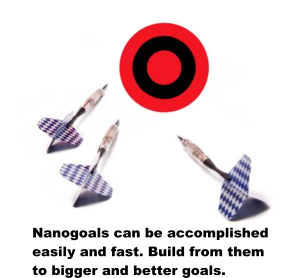 Do you sometimes find your motivation lacking relative to making your day worthwhile? Do you find it difficult ot focus on goals for the day or even for an hour?
Do you sometimes find your motivation lacking relative to making your day worthwhile? Do you find it difficult ot focus on goals for the day or even for an hour?
Here's a trick that has helped me on more than one occasion: nanogoals.
What are nanogoals? Just like what nano sounds like: goals that are so short in time that if you blink you might have finished it.
What are some examples of nanogoals: Read More...
“Oh Gawwwd! I made a mistake!”
 How can a mistake be a happy mistake?
How can a mistake be a happy mistake?
In my previous post, I created a video on self-discipline. In the process of creating it, I made a big mistake. Can you tell where it was?
If you guessed in the middle between the general discussion and the more personal discussion, you'd be right.
I don't need to go into what happened, other than to say, I didn't like how it came off in the video. So I got rid of it.
What resulted though was a real advance over previous videos.
In what way?
I learned how to create different scenes. There are two scenes in that video: the general and the personal. They are separated by branded graphics, with music that fades in and out.
The skill and ability to create decent videos is getting better by the week.
More new stuff on the way in the coming weeks.
But the more important point - the point of this post - is that mistakes are not necessarily bad things. They may be things you'd rather not have to deal with. But if you are on the lookout for opportunities - even if only the opportunities to learn something, then harnessing mistakes becomes not just possible, but likely too.

The Power of Self-Discipline
There is great power in self-discipline. Opportunities and necessities - both call for - well watch this very short video and ask yourself where self-discipline can serve you well.
Can you recall instances in your life where you missed an opportunity because you didn't exercise the self-discipline that would have prepared you? Can you do better starting today?

Common Sense about Gold, etc.
After an hour-long discussion with a friend, where he tried to convince me that I should be buying gold, I quickly came to see that I should decline. This short video tells you why.
Note: I'm not a financial adviser. You are presumed to have the intelligence to know the difference between opinion and fact. I provide opinion about how I see things. You are under no obligation to see things as I do and you are charged with making your own choices. But you should... Just kidding... But you should... 🙂
I'd appreciate knowing your thoughts on this - good, bad, etc. Be cool, don't spam, and place nice and I'll be happy to have your comment on my site.

How I Gained 2 Productive Hours a Day – For Free!
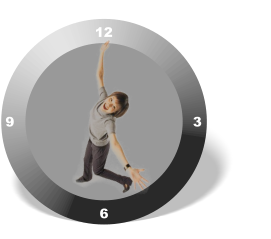 I have gained two hours a day in productive time - for free. It was free and has made my life a lot easier. If you habitually waste time in the same way I do: spending time on websites (political sites, various "interesting" forums that have nothing to do with your goals, etc.), you will find this solution a godsend.
I have gained two hours a day in productive time - for free. It was free and has made my life a lot easier. If you habitually waste time in the same way I do: spending time on websites (political sites, various "interesting" forums that have nothing to do with your goals, etc.), you will find this solution a godsend.
While reading Tim Ferris' Four Hour Work Week blog, he mentioned a very cool productivity tool called called LeechBlock, a Firefox plug-in. As I read about it, I realized I needed this plug-in. I liked what I saw and installed it.
Now when I want to visit a politics website during times I should be busy working toward my goals, the site is blocked and I am given an opportunity to be productive. I've gone from being my own worst boss to being, well - a better boss.
Here's what LeechBlock does: Read More...
